Alternator Replacement in Lexington, KY
- CELEBRATING 46 YEARS
- Family Owned & Operated
- All Makes & Models
- CELEBRATING 46 YEARS
- Family Owned & Operated
- All Makes & Models
Contact Us
Alternator Replacement - Keep Your Electrical System Charged
Lisa’s day started normally until her dashboard lit up like a Christmas tree. Battery warning light, headlights dimming, radio cutting out – classic signs of alternator failure. She made it to our shop just as her car was losing power. After testing confirmed her alternator was dead, we installed a quality replacement and had her back on the road the same day. “I had no idea how much my car depended on that alternator,” she said.
Our Services
Contact Us
What Your Neighbors Are Saying About Us
They truly care about offering the right service and doing it at a very fair price. They were patient to explain everything in detail and had my car fixed same day. Their honesty and great service will keep me coming back for all of my car needs. A solid repair shop that will be my first choice going forward.
Could not be happier with the recent service I received at Powers Transmissions! David and his team are very knowledgeable and pleasant to work with. It’s nice to have the peace of mind knowing everything is done correctly. Very happy with the experience and highly recommend!
What stood out to me was their willingness to listen to my concerns over the phone and provide an accurate estimate for the repair timeline. Unlike some places, they didn't try to deceive me just to get me in the door. You can genuinely sense their passion for their work and helping customers.
Wow, excellent job. My HUMMER H2 runs so good. Now the Transmission can pull a barn down I have known Mr. powers for years. He is a stand up guy if he says something you can take it to the bank. I'm very happy.
Powers Transmissions took over and had my car done in less than a week. They worked with my warranty company and kept me updated on everything that was happening. Completely professional and competent unlike the first place I went! Thank you for all your help!
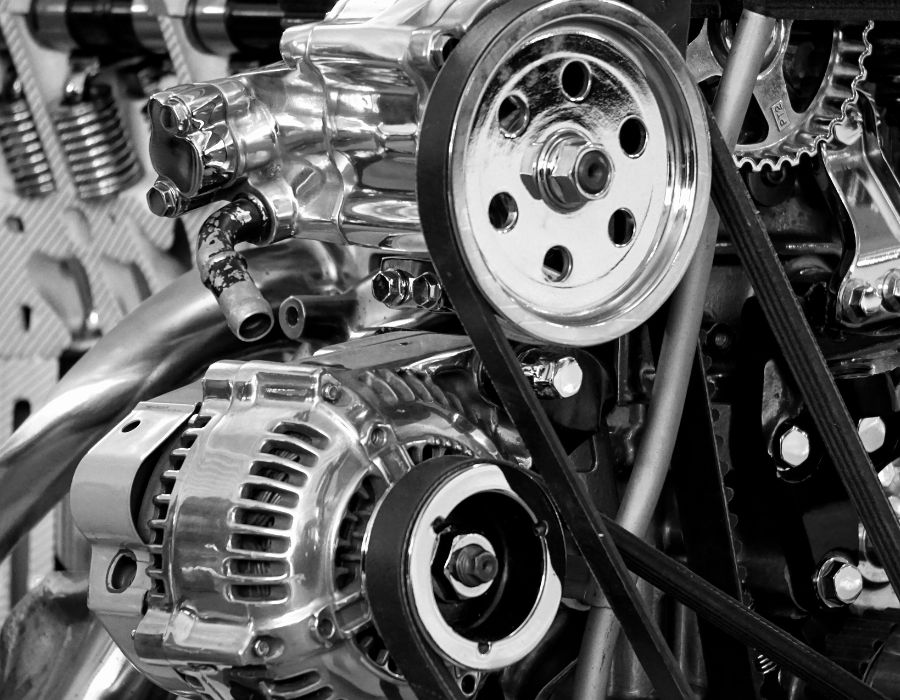
What Your Alternator Does
Your alternator is your car’s power plant. While the battery starts your engine, the alternator takes over once the engine is running, generating electricity to power everything from your headlights to your fuel injection system. It also recharges your battery so it’s ready for the next startup.
Modern cars are electrical powerhouses. Air conditioning, power steering, fuel injection, ignition systems, computers, lights, radio – they all depend on steady electrical power from your alternator. When it fails, you’re running on battery power alone, which doesn’t last long.
Signs Your Alternator Is Failing
- Dashboard Warning Lights: The battery or charging system warning light is usually the first sign. Don’t ignore it – this light means your electrical system needs immediate attention.
- Dimming Headlights: If your headlights dim when you’re idling and brighten when you rev the engine, your alternator isn’t keeping up with electrical demand.
- Dead Battery: If your battery keeps dying even though it’s relatively new, your alternator might not be charging it properly.
- Electrical Problems: Flickering interior lights, radio cutting out, or power accessories working intermittently can all indicate alternator problems.
- Strange Noises: A grinding, whining, or squealing noise from the engine bay might be a worn alternator bearing or belt.
- Burning Smell: An overheating alternator can produce a burning electrical smell. If you smell this, stop driving and have your car checked immediately.
- Stalling or Hard Starting: As the alternator fails, your ignition system gets weak power, causing misfires, stalling, or difficulty starting.
What Causes Alternator Failure
- Normal Wear: Alternators contain moving parts and electrical components that wear out over time. Most alternators last 80,000 to 150,000 miles with proper maintenance.
- Belt Problems: A loose, worn, or broken serpentine belt can prevent the alternator from spinning properly, leading to undercharging or overheating.
- Electrical Overload: Aftermarket accessories like high-powered stereos, lights, or other electrical modifications can overwork your alternator.
- Heat Damage: Excessive heat from a failing cooling system or blocked airflow can damage alternator components.
- Water Damage: Driving through deep water can damage alternator windings and bearings.
- Poor Connections: Corroded or loose electrical connections can cause the alternator to work harder and fail prematurely.
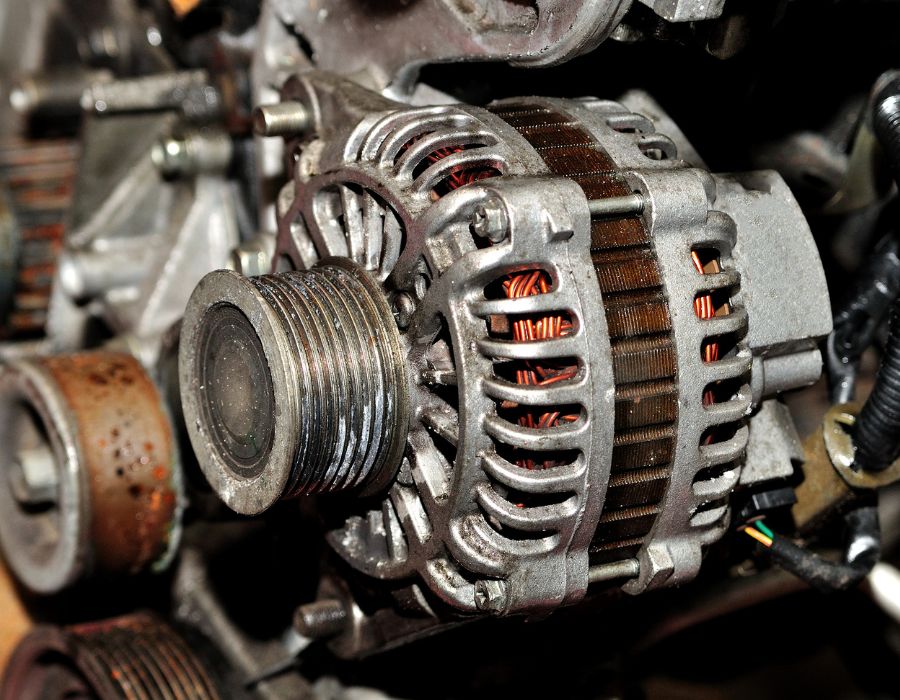
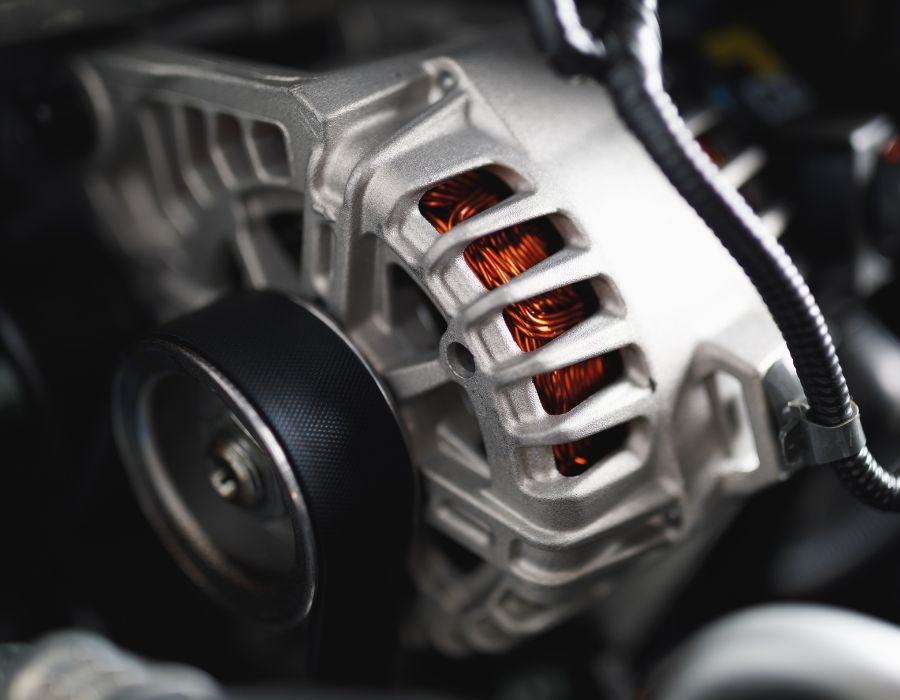
Our Alternator Replacement Process
When you bring your car in with charging system problems, we don’t assume you need a new alternator right away. Here’s our diagnostic approach:
- Electrical System Testing: We use professional test equipment to check alternator output, battery condition, and charging system performance. Sometimes what seems like alternator failure is actually a bad battery or wiring problem.
- Belt Inspection: We check the serpentine belt for proper tension, wear, and alignment. A loose or damaged belt can cause charging problems that look like alternator failure.
- Connection Check: We inspect all electrical connections for corrosion, looseness, or damage that could affect charging system performance.
- Load Testing: We test the alternator under various electrical loads to make sure it can handle your vehicle’s power demands.
- Quality Replacement: If your alternator needs replacement, we install a quality unit that meets or exceeds your vehicle’s original specifications.
- System Verification: After installation, we test the entire charging system to make sure everything works properly and your battery is charging correctly.
Types of Alternator Problems
- Complete Failure: The alternator stops producing electricity entirely. Your car will run on battery power until the battery dies.
- Undercharging: The alternator produces some power but not enough to keep up with electrical demand or properly charge the battery.
- Overcharging: Less common but dangerous, an overcharging alternator can damage your battery and electrical components.
- Intermittent Failure: The alternator works sometimes but cuts out unpredictably, causing electrical problems that come and go.
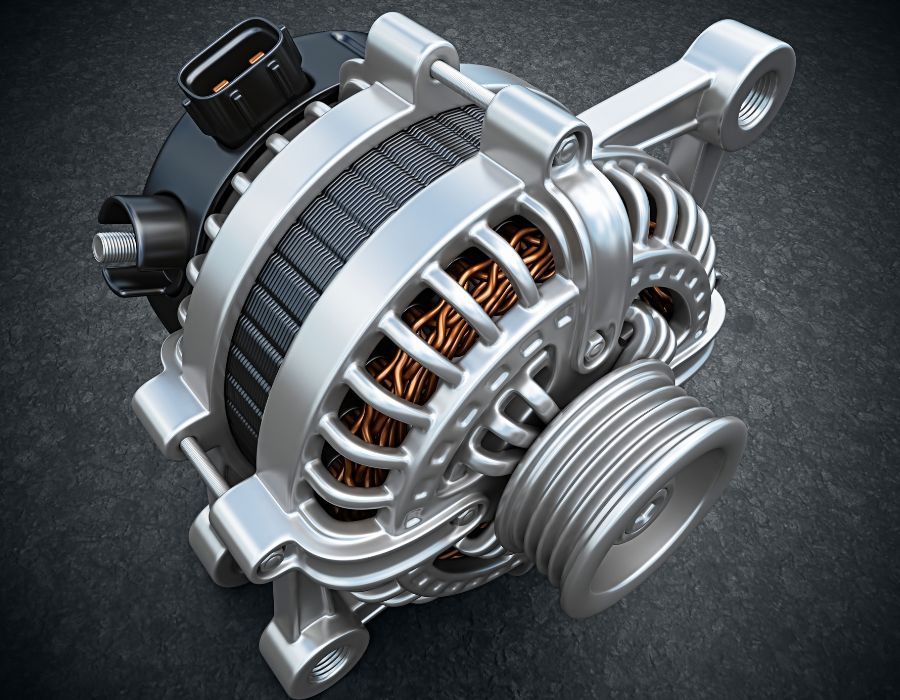
Alternator vs Generator
Older vehicles used generators instead of alternators. Generators produce direct current (DC) but are less efficient and durable than alternators. Alternators produce alternating current (AC) that’s converted to DC for your car’s electrical system. They’re more efficient, lighter, and last longer than generators.
If you’re restoring a classic car, you might consider upgrading from a generator to an alternator for better electrical performance and reliability.
Preventing Alternator Problems
- Regular Belt Maintenance: Keep your serpentine belt properly tensioned and replace it when it shows signs of wear. A failing belt can destroy an alternator.
- Clean Connections: Check battery terminals and alternator connections for corrosion. Clean, tight connections help your alternator work efficiently.
- Avoid Electrical Overload: Don’t add high-power accessories without considering your alternator’s capacity. Oversized stereos or auxiliary lighting can overwork your charging system.
- Address Cooling Problems: Keep your engine cooling system in good condition. Overheating can damage alternator components.
- Regular Testing: Have your charging system tested during routine maintenance, especially if your vehicle is over five years old.
Seasonal Alternator Considerations
- Winter Stress: Cold weather increases electrical demand from heaters, defrosters, and lights while reducing alternator efficiency. Winter is when marginal alternators often fail.
- Summer Heat: High temperatures and air conditioning use stress alternators. Make sure your cooling system is working properly to prevent alternator overheating.
- Storm Season: If you drive through flooded areas, have your alternator checked afterward. Water damage might not show up immediately.
Emergency Alternator Failure
If your alternator fails while driving, you have limited time before your battery dies. Turn off all unnecessary electrical accessories – air conditioning, radio, lights you don’t need. Drive directly to our shop or the nearest service facility.
Signs your battery is dying: dimming headlights, sluggish engine performance, dashboard lights flickering. If these symptoms get worse quickly, pull over safely and call for help rather than risk being stranded in traffic.
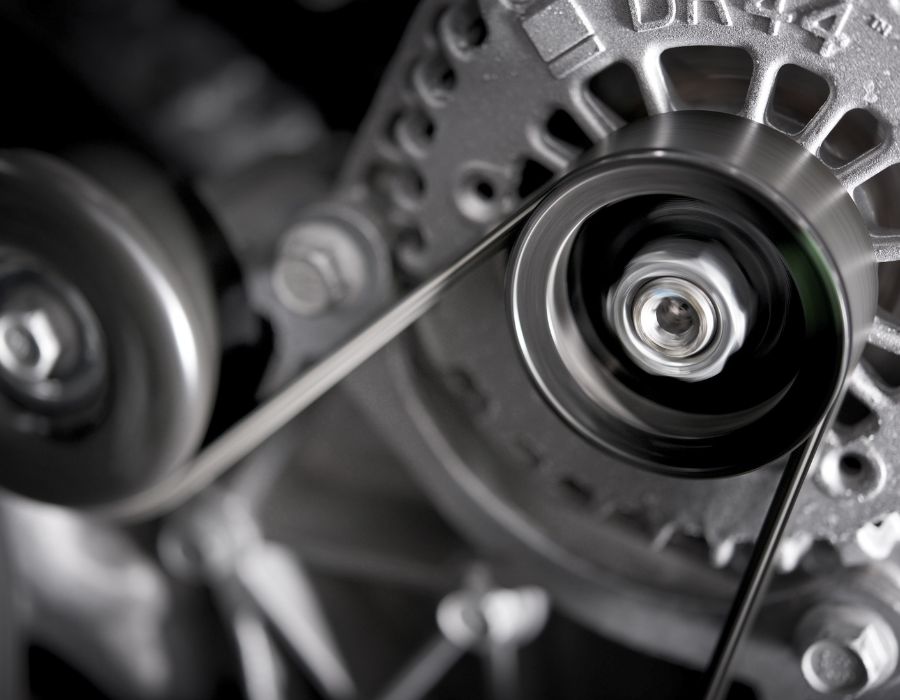
Quality Parts Make a Difference
Not all alternators are created equal. Cheap rebuilt units might last only a year or two, while quality alternators can go 100,000 miles or more. We use alternators from reputable manufacturers that come with solid warranties.
Some vehicles have high-output alternators for police, taxi, or commercial use. If your vehicle came with a high-output alternator, that’s what we’ll install as a replacement.
Why Choose Our Alternator Service
We’ve been diagnosing and repairing charging system problems for over 15 years. Our ASE-certified technicians have the experience and equipment to properly diagnose alternator problems and distinguish them from other electrical issues.
We keep detailed records of your vehicle’s service history and can often predict when charging system components might need attention based on your vehicle’s age and mileage. When you do need alternator replacement, we use quality parts and stand behind our work with comprehensive warranties.
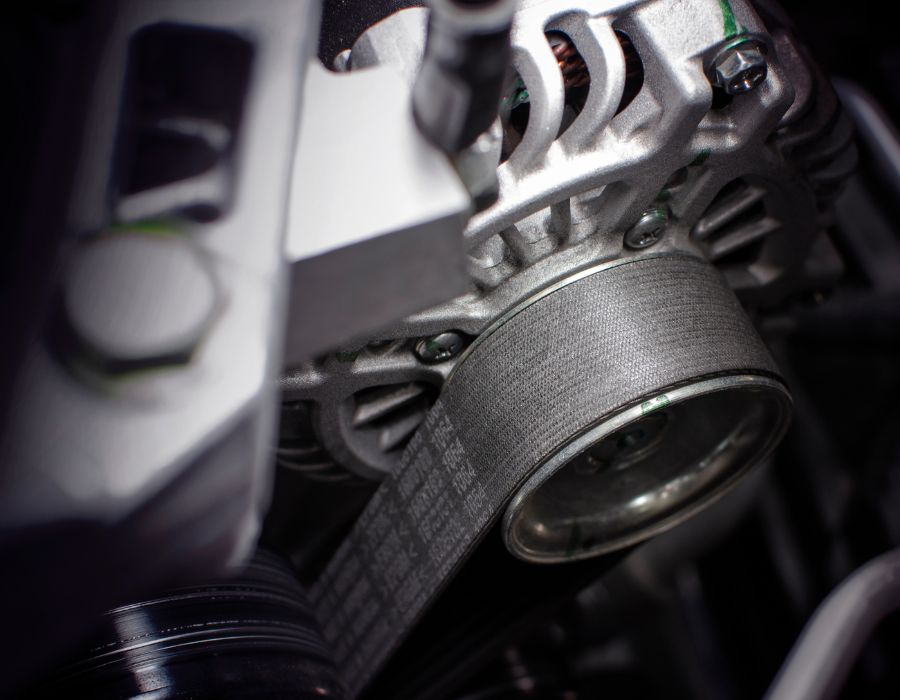
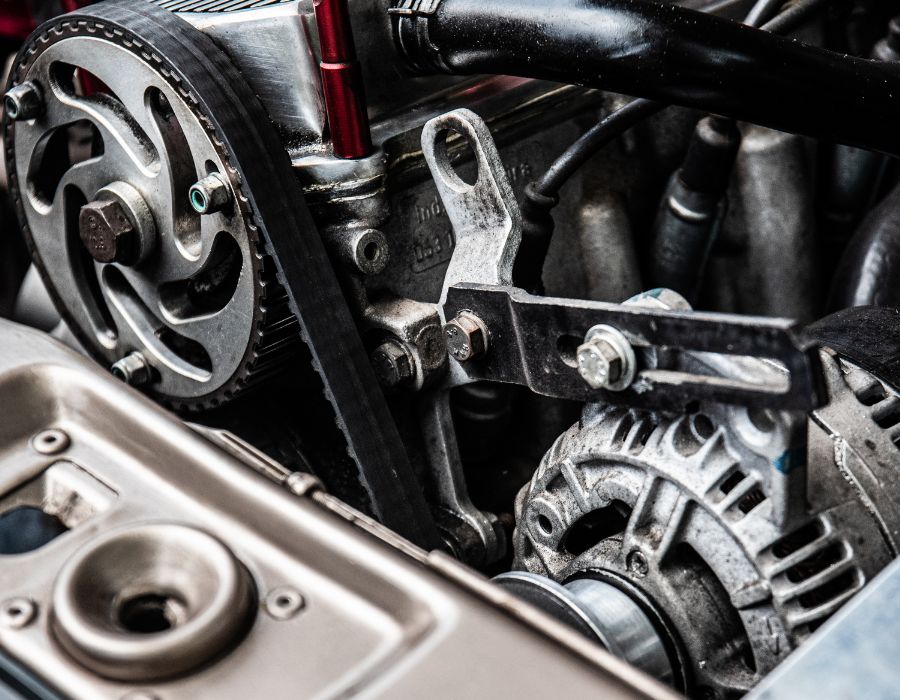
Schedule Your Charging System Check
Don’t wait for complete alternator failure to address charging system problems. If you’re seeing warning lights, experiencing electrical issues, or your vehicle is approaching 100,000 miles, have your charging system tested. Catching alternator problems early can save you from being stranded and protect your expensive electronic components from voltage problems.
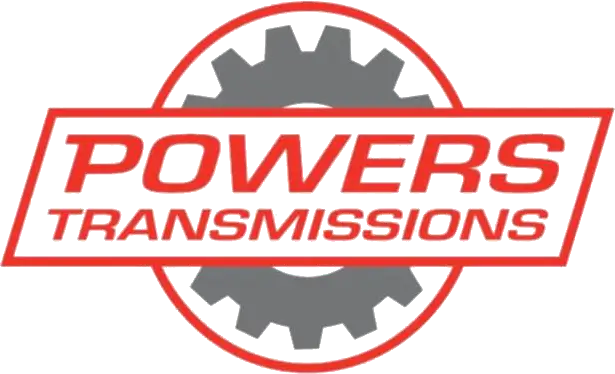
Areas We Serve
- Winchester Lexington
- Lane Allen Lexington
